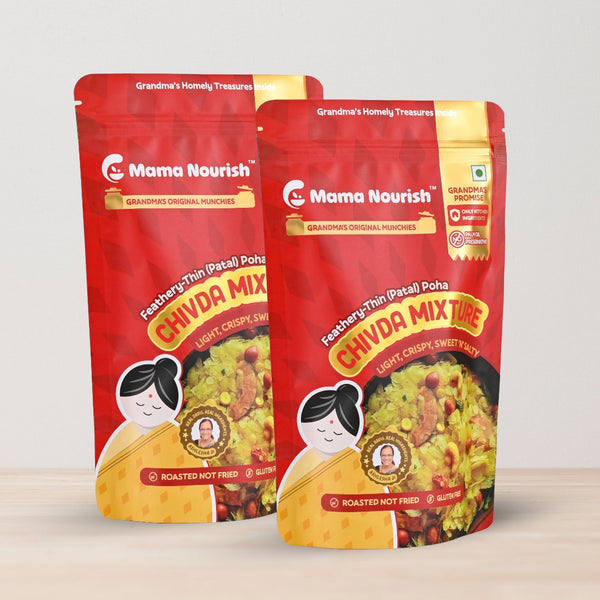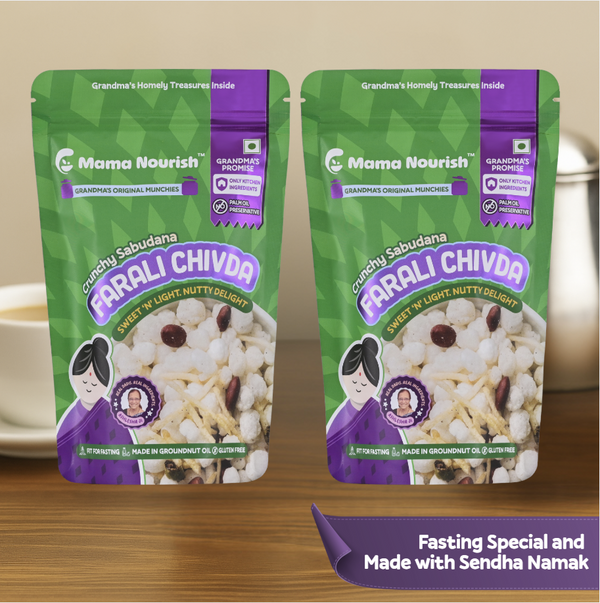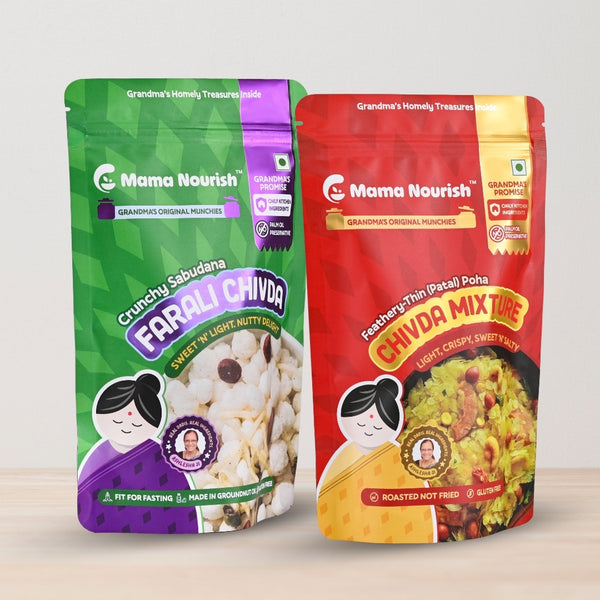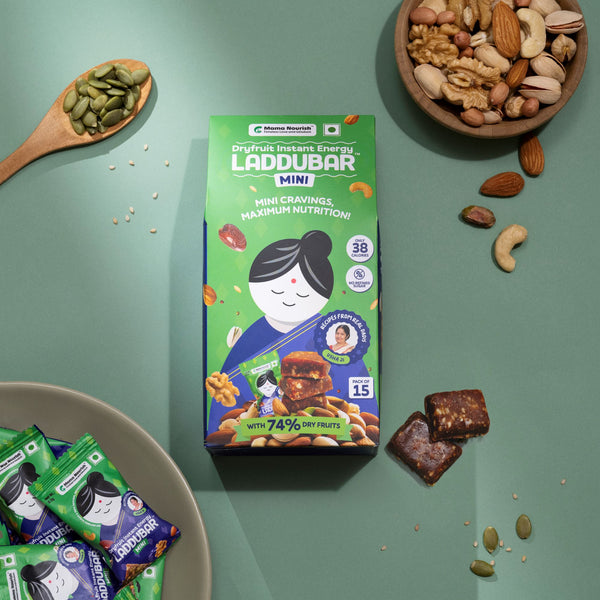Home
>
Nourishing Trails
Foods That Are Surprisingly High in Refined Sugar and Healthy Alternatives!

Foods That Are Surprisingly High in Refined Sugar and Healthy Alternatives!
Well, if you think ditching that doughnut and pastries will help you to reduce sugar consumption–you are wrong.
Because refined sugar is found even in savoury food, they are hiding in many food items which you won't expect.
So, let's go through some of these foods high in sugar content & best alternatives for them.
1. Breakfast Cereals
For many of us, breakfast cereals are a quick and convenient choice. But have you ever checked the sugar content? Some cereals can contain as much as 33g or more of sugar per 100g, which equals 8 teaspoons, making them one of the top foods on the list of foods high in sugar. Even the average cereal can have around 20.7g of sugar per 100g, or about 5 teaspoons.
A single cup of breakfast cereal can contain 2–3 teaspoons or more of refined sugar, depending on the brand and type of cereal. Some sugary cereals may have even higher amounts of sugar per serving.
Sweetened breakfast cereal can give you a quick energy boost, but it only lasts for a short time, and hunger pangs hit way before lunchtime.
Breakfast cereals (1 cup, approx. 50g) typically contain:
-
187 calories
-
45 grams of carbohydrates
-
3 grams of protein
-
2 grams of fiber
-
20 grams of sugar (often added)
Healthy alternatives: Go for a savoury breakfast–just like our traditional breakfast options like idly. Idli, made from fermented rice and urad dal, is light yet filling.
Idli (1 piece, approx. 30g) typically contains:
-
40 calories
-
8 grams of carbohydrates
-
2 grams of protein
-
2 grams of fiber
-
0 grams of refined sugar
Due to the fermentation process in the making, idly it's gut-friendly, enhancing digestion and nutrient absorption.

Unlike sugar-loaded cereals, idli keeps you fuller for longer, preventing mid-morning cravings. If you still want to go for cereals, choose ones without added sugar on the label.
2. Ketchup
When it comes to condiments, ketchup is a common favourite, but it often hides added sugars that can impact your health. While it boosts flavour, ketchup can be loaded with unnecessary sugars and calories. If you are wondering what are foods high in sugar—-well, you can not skip ketchup.
Ketchup (1 tablespoon, approx. 15g) contains:
-
20 calories
-
5 grams of carbohydrates
-
4 grams of sugar (often from high-fructose corn syrup)
-
0.1 grams of dietary fibre
-
0 grams of fat
Foods high in sugar are generally considered to be harmful to health, and studies show that, so switch to healthier alternatives. The high sugar content in ketchup is a concern if consumed frequently, as it can contribute to excess calorie intake without offering much nutritional value.
Homemade chutney: is a healthier alternative, made from natural ingredients like veggies, fruits, herbs, and spices, giving you full control over the sugar content.
Homemade chutney (1 tablespoon, approx. 17g) contains:
-
15 calories
-
2 grams of carbohydrates
-
0.5 grams of sugar (from natural sources)
-
0.5 grams of dietary fibre
-
0.9 grams of fat
Homemade chutneys are typically free of added sugars and can be customized to fit your taste while providing a burst of flavour without the excess calories or refined sugar found in ketchup.

3. Salad Dressing
Store-bought salad dressings are often convenient, but they can be loaded with unhealthy fats, sugars, and artificial additives. While they add flavour to your salad, they may also contribute to excess calories and unhealthy ingredients.
Store-bought salad dressing (2 tablespoons, approx. 30g/ ml ) contains:
-
120 calories
-
10 grams of fat (including trans fats)
-
6.1 grams of carbohydrates
-
6 grams of sugar
Many commercial dressings are high in unhealthy fats, like trans fats, and can have added sugars and preservatives that may undermine your health goals.
In contrast, a healthy homemade dressing is made with wholesome ingredients like olive oil, vinegar, and natural herbs, providing healthy fats and flavour without the extra calories or additives.
Healthy homemade dressing (2 tablespoons, approx. 30g) contains:
-
120 calories
-
12 grams of fat (from healthy olive oil)
-
1 gram of carbohydrates
-
0.1 grams of added sugar
Homemade dressings allow you to control the ingredients, offering a nutrient-dense option that’s lower in sugar and free from artificial additives, while still complementing your salad with healthy fats.

4. Beverages
Beverages like sugary drinks or sodas can provide instant refreshment, but they often come with a hefty dose of sugar, artificial sweeteners, and empty calories, making them foods high in sugar to avoid. These drinks may quench thirst but do little to provide essential nutrients.
Sugary beverage (1 can, approx. 375ml) contains:
-
150 calories
-
40 grams of carbohydrates
-
40 grams of sugar / 10 teaspoons (from added sugar)
-
0 g fiber
Sugary beverages contribute significant sugar to your diet without offering any vitamins or fibre, making them a poor hydration choice over time.
In contrast, fruits offer a natural, nutrient-rich alternative. Packed with vitamins, fibre, and natural sugars, fruits are not only hydrating but also help nourish the body with essential nutrients.
Medium-sized apple (approx. 182g) contains:
-
95 calories
-
25 grams of carbohydrates
-
0 grams of sugar
-
19g natural sugar
-
4 grams of fiber
Fruits provide natural hydration along with beneficial nutrients such as vitamins, fibre, and antioxidants, making them a healthier option for satisfying thirst and hunger without added sugar and empty calories.

5. Granola Bars
Granola bars are often marketed as healthy snacks, but many store-bought varieties contain added sugars, preservatives, and artificial ingredients. While they provide quick energy, they may not always be the best option for a truly nutritious snack.
Granola Bar (1 bar, approx. 28g):
-
132 calories
-
18g carbohydrates
-
12 g sugar (from added sugars and syrups)
-
1.1g Fibre
Mama Nourish’s Dry Fruit LadduBars are made with natural ingredients like dates, nuts, and seeds, offering a nutrient-rich alternative without refined sugar or artificial additives.
Dry fruit LadduBar ( 1 bar, 35g)
-
158 Calories
-
19. 33g Carbs
-
0g Refined Sugar
-
2. 83 g Fiber

6. Flavoured Yogurt
Flavoured yoghurts are often marketed as a healthy snack, but they can be loaded with added sugars and artificial flavours. While they provide some protein and probiotics, the extra sugar makes them less ideal for regular consumption.
Flavoured yoghurt (1 cup, approx. 245g) contains:
-
150 calories
-
28 grams of carbohydrates
-
18 grams of sugar (mostly added sugar)
-
5 grams of protein
-
3 grams of fat
Many flavoured yoghurts contain high-fructose corn syrup or artificial sweeteners, increasing sugar intake without offering much additional nutrition. This added sugar can contribute to weight gain, blood sugar spikes, and cravings.
Plain homemade yoghurt is a healthier alternative. It provides the same probiotics and nutrients as flavoured yoghurt but without the unnecessary sugars and additives. You can naturally enhance the taste by adding fresh fruits, nuts, or honey in moderation.
Plain homemade yoghurt (1 cup, approx. 245g) contains:
-
100 calories
-
8 grams of carbohydrates
-
6 grams of sugar (naturally occurring from milk)
-
10 grams of protein
-
5 grams of fat
Homemade yoghurt is higher in protein and lower in sugar, making it a more balanced option. It also allows you to control the ingredients, ensuring a natural and nutrient-rich snack.
 Note: The article is provided for informational purposes only & nutritional facts may vary for different products.
Note: The article is provided for informational purposes only & nutritional facts may vary for different products.
Share





